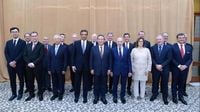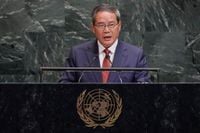China’s Premier Li Qiang stepped onto the world stage in New York this week, delivering a speech at the 80th session of the United Nations General Assembly that echoed longstanding Chinese concerns about unilateralism and protectionism, while also calling for renewed efforts to stabilize and strengthen relations between China and the United States. Li’s appearance—his most prominent international debut since becoming premier two and a half years ago—was closely watched for both its substance and symbolism, as global economic anxieties and geopolitical tensions continue to simmer.
Addressing world leaders on September 26, 2025, Li Qiang did not mince words about the challenges facing the global community. "Unilateralism and Cold War mentality are resurfacing," Li warned, according to the Associated Press. He added, "History keeps reminding us that when might dictates right, the world risks division and regression. Should the era of the law of the jungle return and the weak be left as prey to the strong, human society would face even more bloodshed and brutality." His speech was filled with cultural flourishes and evocative imagery, a notable departure from his typically pragmatic domestic addresses. Li described his impressions upon arriving at the U.N. headquarters, reflecting on the sight of "over 190 national flags lined up in front of the building and fluttering in the breeze," and the sculptures that "have beat swords into plowshares and non-violence with their time-tested message ever so loud."
Li’s remarks, though sweeping and assertive, were also carefully diplomatic. Notably, he never mentioned the United States by name—an omission that, as the Associated Press observed, could itself be read as a subtle act of diplomacy. Still, the subtext was unmistakable. Li’s criticisms of "tariff hikes and the erection of walls and barriers" as a "major cause of the current global economic doldrums" were widely interpreted as a reference to the trade policies of the Trump administration, which imposed harsh tariffs on Chinese goods earlier in the year before agreeing to a 90-day truce.
Speaking on behalf of President Xi Jinping, Li told the General Assembly, "We should collaborate more closely to identify and expand convergence of interests, promote universally beneficial and inclusive economic globalization, and help each other succeed by moving forward in the same direction." He cautioned against "persisting in camp-based confrontation or willful resort to force," warning that such moves "only drive peace further away." According to Al Jazeera, Li also positioned China as a "staunch defender of world peace and security," noting that it is the second-largest contributor to the U.N. peacekeeping budget and the largest provider of peacekeepers among the permanent members of the Security Council. He highlighted China’s active efforts to promote peace talks on hotspot issues like the Ukraine crisis and the Israeli-Palestinian conflict.
On September 25, the day before his U.N. address, Li met with representatives from several influential U.S. organizations—including the U.S.-China Business Council, the National Committee on U.S.-China Relations, the U.S. Chamber of Commerce, and the Council on Foreign Relations—as well as business leaders and scholars. During these discussions, Li emphasized that China-U.S. relations are "the most important bilateral relations in the world," and that the two countries "can and should be partners and friends." He invoked a phrase often used by President Xi—that "the broad Pacific Ocean is vast enough to embrace both China and the United States, as well as other countries."
Li stressed the importance of economic and trade cooperation, describing the two countries’ market structures as highly complementary. "Closer economic and trade cooperation between China and the United States will mutually benefit the two countries and the world as a whole," he said, according to Xinhua. He expressed confidence in China’s ability to maintain "stable and healthy economic development," and pledged that China would "do its utmost to provide greater certainty for the development of foreign businesses," regardless of external pressures. "China will always work with the U.S. side to jointly promote the stabilization and improvement of China-U.S. economic and trade ties, on the basis of equality, respect, and mutual benefit, while upholding a constructive and responsible attitude," Li said.
Li’s message to American businesses was one of reassurance and opportunity. He committed to "continuously relax market access, and expand imports," and promised to "actively respond to foreign businesses' concerns and offer help to resolve practical difficulties, so as to ensure that foreign businesses feel at ease when operating and developing in China." According to China Daily, Li also called for "people from all walks of life in the United States" to "take more positive actions to enhance mutual understanding between the two countries, expand practical cooperation in various fields, and make greater contributions to promoting the development of both countries and enhancing their friendship."
The response from the U.S. side was generally positive, if cautiously optimistic. Representatives of the U.S. business community praised China’s economic achievements and expressed hope for expanded investment and long-term stability in bilateral relations. Sean Stein, president of the U.S.-China Business Council, described the meeting as "an important opportunity to highlight the primary concerns of the U.S. business community in China and to discuss the need for progress on longstanding issues affecting trade and investment." A statement from the National Committee on U.S.-China Relations echoed the importance of "forthright dialogue" in fostering mutual understanding and promoting U.S. interests.
Behind the scenes, diplomatic efforts to stabilize the relationship have continued. The meeting between Li and American organizations followed a phone conversation between President Xi Jinping and President Donald Trump on September 19—the third such call this year, as both leaders sought to keep lines of communication open. On the same day as Li’s meetings in New York, Vice-Foreign Minister Ma Zhaoxu met with U.S. Deputy Secretary of State Christopher Landau to discuss bilateral relations and regional issues. Ma reiterated China’s position on Taiwan, emphasizing that it remains a "core interest" and urging the U.S. to adhere to the one-China policy.
Li’s speech at the U.N. was also notable for its personal tone and cultural references, a departure from the more technocratic style of his domestic addresses. He reflected on the symbolism of the U.N. campus and the "scenes that embody peace, progress, and development," saying, "They’re also what inspires us to forge ahead, hand in hand." Still, as the Associated Press pointed out, there remains a gap between China’s rhetorical emphasis on multilateralism and its actions on contentious issues such as human rights in Xinjiang and Hong Kong.
As the world’s two largest economies prepare for a possible meeting between Trump and Xi on the sidelines of the upcoming APEC summit in South Korea, the stakes for U.S.-China relations remain high. Both sides appear keenly aware that their actions—and their words—will shape not only their own futures, but the trajectory of the global order itself.
For now, Li Qiang’s U.N. debut has set a tone of cautious engagement, urging dialogue over confrontation and partnership over rivalry. Whether that tone can be translated into concrete progress remains to be seen, but the world will be watching closely.


